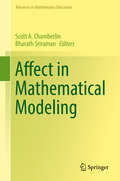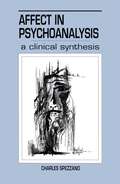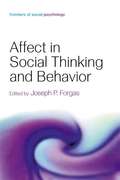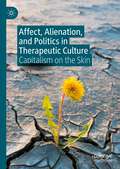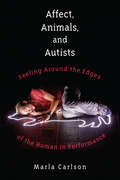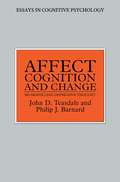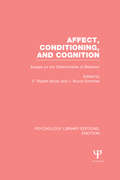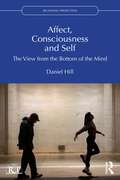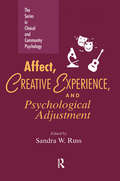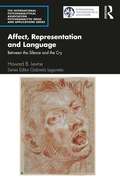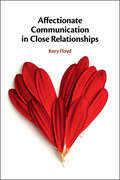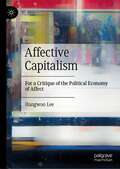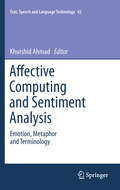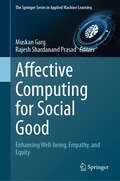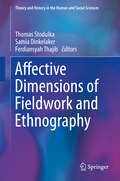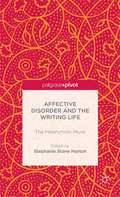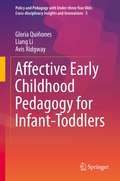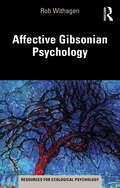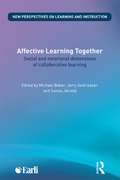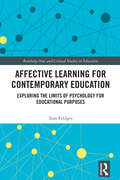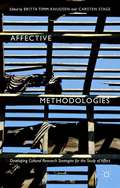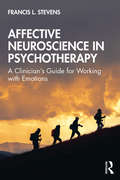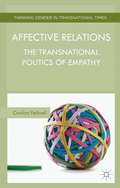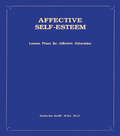- Table View
- List View
Affect in Mathematical Modeling (Advances in Mathematics Education)
by Bharath Sriraman Scott A. ChamberlinIn the book, the relationship between affect and modeling is discussed because, as educational psychologists have suggested for decades, affect directly influences achievement. Moreover, given the importance of mathematical modeling and the applications to high level mathematics, it provides the field of mathematics psychology with insight regarding affect, in relation to mathematical modeling. By doing so it helps determine the degree to which understanding of mathematics and understanding affect in mathematical modeling episodes may have a direct effect on cognition.
Affect in Psychoanalysis: A Clinical Synthesis (Relational Perspectives Book Series)
by Charles SpezzanoDrawing on the writings of Freud, Fairbairn, Klein, Sullivan, and Winnicott, Spezzano offers a radical redefinition of the analytic process as the intersubjective elaboration and regulation of affect. The plight of analytic patients, he holds, is imprisonment within crude fantasy elaborations of developmentally significant feeling states. Analytic treatment fosters the patient's capacity to keep alive in consciousness, and hence reflect on, these previously warded-off affective states; it thereby provides a second chance to achieve competence in using feeling states to understand the self within its relational landscape.
Affect in Social Thinking and Behavior (Frontiers of Social Psychology)
by Joseph P. ForgasThe role of affect in how people think and behave in social situations has been a source of fascination to laymen and philosophers since time immemorial. Surprisingly, most of what we know about the role of feelings in social thinking and behavior has been discovered only during the last two decades. Affect in Social Thinking and Behavior reviews and integrates the most recent research and theories on this exciting topic, and features original contributions reviewing key areas of affect research from leading researchers active in the area.The book covers fundamental issues, such as the nature and relationship between affect and cognition, as well as chapters that deal with the cognitive antecedents of emotion, and the consequences of affect for social cognition and behavior.This volume offers a highly integrated and comprehensive coverage of this field, and is suitable as a core textbook in advanced courses dealing with the role of affect in social cognition and behavior.
Affect, Alienation, and Politics in Therapeutic Culture: Capitalism on the Skin
by Suvi SalmenniemiThis book contributes to research on therapeutic culture by drawing on longstanding ethnographic work and by offering a new theoretical reading of therapeutic culture in today's society. It suggests that the therapeutic field serves as a key site in which a number of contradictions of capitalism are confronted and lived out. It shows that therapeutic engagements are inherently ambivalent and contradictory, as they can be articulated and engaged with in many different ways and harnessed for diverse, and often contradictory, political projects. The book takes issue with the interpretation of therapeutic culture as merely individualising, depoliticizing and working in congruence with neoliberalism, and shows that therapeutic engagements may also open up a space for contestation and critique of neoliberal capitalism, animate collective action for social change and articulate alternative forms of life and subjectivities. The book will speak to a wide variety of audiences in the social sciences and will be of particular interest to those working in the fields of sociology, anthropology, critical psychology, cultural studies, gender studies, and critical social theory.
Affect, Animals, and Autists: Feeling Around the Edges of the Human in Performance
by Marla CarlsonWhen theater and related forms of live performance explore the borderlands labeled animal and autism, they both reflect and affect their audiences’ understanding of what it means to be human. Affect, Animals, and Autists maps connections across performances that question the borders of the human whose neurodiverse experiences have been shaped by the diagnostic label of autism, and animal-human performance relationships that dispute and blur anthropocentric edges. By analyzing specific structures of affect with the vocabulary of emotions, Marla Carlson builds upon the conception of affect articulated by psychologist Silvan Tomkins. The book treats a diverse selection of live performance and archival video and analyzes the ways in which they affect their audiences. The range of performances includes commercially successful productions such as The Curious Incident of the Dog in the Night-Time, War Horse, and The Lion King as well as to the more avant-garde and experimental theater created by Robert Wilson and Christopher Knowles, Back to Back Theatre, Elevator Repair Service, Pig Iron Theatre, and performance artist Deke Weaver.
Affect, Cognition and Change: Re-Modelling Depressive Thought (Essays in Cognitive Psychology)
by John Teasdale Philip BarnardThis text, a collaboration between a clinical psychologist and a cognitive psychologist, offers a cognitive account of depression.
Affect, Conditioning, and Cognition: Essays on the Determinants of Behavior (Psychology Library Editions: Emotion)
by J. Bruce Overmier F. Robert BrushOriginally published in 1985, this title was a retrospective appreciation of the late Richard L. Solomon. His pre- and postdoctoral students from past years presented the 22 papers which are published in this volume. The book reflects the breadth of Solomon’s impact through his teaching and research. The first part contains a chapter that provides a bit of history in a retrospective appreciation of the several foci of Solomon’s research career. This chapter sets the stage for those that follow and reduces their diversity by providing a degree of historical understanding. The second part on the role of properties of fear contains chapters that address various issues associated with the role of conditioned fear. The third part contains papers that address cognitive, information-processing issues in the context of Pavlovian conditioning of appetitive and aversive events, reasoning and timing. The fourth part continues the exploration of the phenomenon of learned helplessness first discovered in Solomon’s laboratory. The fifth part addresses various issues associated with the Solomon and Corbit opponent-process theory of motivation and affect. The final part, on applications to human and cultural issues, contains chapters on such diverse subjects as cross-cultural analyses of aggressive behavior in children, the analysis of resistance to change in industrial organizations, the concept of liberty in formulating research issues in developmental psychology, and the status of free will in modern American psychology.
Affect, Consciousness and Self: The View from the Bottom of the Mind (Relational Perspectives Book Series)
by Daniel HillThis book argues that mental life is organized by and around affect. It proposes a clinical model for understanding how affect influences states of consciousness and self. It illustrates how, from moment to moment, affect determines the world we know, how we are disposed to being in it, and our capacity to function in it.After introducing consciousness and self as features of mind that have posed daunting problems for philosophy, neurology, and psychoanalysis, subsequent chapters propose a model for understanding them at the clinical level. Initial chapters are devoted to the influence of affect on the structure and dynamics of normal waking consciousness and on the self’s capacity to act agentically, to relate intersubjectively, and to develop itself. Final chapters discuss disordered states of consciousness and impeded self‑functioning, due to affect dysregulation and what all this looks like in patients with preoccupied and avoidant attachment patterns.Drawing on psychoanalysis, attachment theory, interpersonal and affective neurobiology, and traumatology, this book offers a fresh perspective on the importance of affect for psychoanalysts and psychodynamic psychotherapists.
Affect, Creative Experience, And Psychological Adjustment (Series In Clinical And Community Psychology Ser.)
by Sandra W. RussFirst published in 1999. Routledge is an imprint of Taylor & Francis, an informa company.
Affect, Representation and Language: Between the Silence and the Cry (The International Psychoanalytical Association Psychoanalytic Ideas and Applications Series)
by Howard B. LevineThis book presents and elaborates on the rationale and implications of the transformational dimension of psychoanalysis. In so doing, it attempts to extend psychoanalytic theory and practice beyond neurosis and beyond what were formerly thought to be the limits of analytic understanding. Its theoretical vision sits at the crossroads of the thinking of Freud, Bion, Winnicott, Green and the Paris Psycho-Somatic School. Other sources include the contributions of contemporary French psychoanalysts such as Laplanche, Donnet, L. Kahn, P. Miller and the Botellas, along with the work of Alvarez, Scarfone, Ferro, Ogden, and more. In re-examining the very epistemological foundations of psychoanalysis and their implications for a theory of psychic functioning, it follows upon and extends the radical implications of Freud’s 1937 Constructions paper, the thoughts of Bion on intuition and Winnicott’s understanding of the working through of the consequences of early pre-verbal environmental failure. In so doing, it makes a case for psychoanalysis as a powerful treatment for borderline, primitive narcissistic, post-traumatic and other character disorders and conditions – including perversions, addictions, psychosomatic, autistic and panic disorders. By presenting a revised metapsychology that is Freudian, contemporary and clinically near, Affect, Representation and Language. Between the Silence and the Cry offers practitioners at all levels of analytic experience a way of understanding and treating the expanding range of patients and disorders that present for treatment in our modern era.
Affectionate Communication in Close Relationships
by Kory FloydFew communication behaviors are more consequential to the development and maintenance of close relationships than the expression of affection. Indeed, people often use affectionate gestures to initiate or accelerate relationship development. In contrast, the absence of affection in established relationships frequently coincides with relational deterioration. This text explores the scientific research on affection exchange that has emerged from the disciplines of communication, social and clinical psychology, family studies, psychophysiology, sociology, nursing, and behavioral health. Specific points of focus include the individual and relational benefits - including health benefits - of affectionate behavior, the significant detriments associated with lacking sufficient affection, and the risks of expressing affection. It also discusses the primary social and cultural influences on affection exchange, critiques principal theories and measurement models, and offers suggestions for future empirical research.
Affective Capitalism: For a Critique of the Political Economy of Affect
by Hangwoo LeeDrawing on Tarde's and Deleuze’s monadology, this book investigates the affective turn of contemporary capitalism. The concept of affect provides critical insight to overcome the limitations of social constructivism and cognitive capitalism. Affective capitalism transforms the population’s everyday bodily experiences into quantitative metrics that can be observed, measured, and processed on a non-conscious register, turning them into dividuals prepared to react and be affected by specific information at a given moment. In an era where social wealth increasingly relies on the 'social factory,' algorithms and big data constitute the living labor beyond employment. This book argues that affect also holds a potential for dismantling today’s real subsumption of life by capital. The network effect, mostly actualized as a company's market capitalization, is constantly traversed by the molecular becoming of affect, leading to new assemblages, such as free software movement, decentralized platforms, peer-to-peer networking, blockchain, and universal basic income.
Affective Communities in World Politics
by Emma HutchisonEmotions underpin how political communities are formed and function. Nowhere is this more pronounced than in times of trauma. The emotions associated with suffering caused by war, terrorism, natural disasters, famine and poverty can play a pivotal role in shaping communities and orientating their politics. This book investigates how 'affective communities' emerge after trauma. Drawing on several case studies and an unusually broad set of interdisciplinary sources, it examines the role played by representations, from media images to historical narratives and political speeches. Representations of traumatic events are crucial because they generate socially embedded emotional meanings which, in turn, enable direct victims and distant witnesses to share the injury, as well as the associated loss, in a manner that affirms a particular notion of collective identity. While ensuing political orders often re-establish old patterns, traumatic events can also generate new 'emotional cultures' that genuinely transform national and transnational communities.
Affective Computing and Sentiment Analysis: Emotion, Metaphor and Terminology (Text, Speech and Language Technology #45)
by Khurshid AhmadThis volume maps the watershed areas between two 'holy grails' of computer science: the identification and interpretation of affect - including sentiment and mood. The expression of sentiment and mood involves the use of metaphors, especially in emotive situations. Affect computing is rooted in hermeneutics, philosophy, political science and sociology, and is now a key area of research in computer science. The 24/7 news sites and blogs facilitate the expression and shaping of opinion locally and globally. Sentiment analysis, based on text and data mining, is being used in the looking at news and blogs for purposes as diverse as: brand management, film reviews, financial market analysis and prediction, homeland security. There are systems that learn how sentiments are articulated. This work draws on, and informs, research in fields as varied as artificial intelligence, especially reasoning and machine learning, corpus-based information extraction, linguistics, and psychology.
Affective Computing for Social Good: Enhancing Well-being, Empathy, and Equity (The Springer Series in Applied Machine Learning)
by Muskan Garg Rajesh Shardanand PrasadAffective Computing for Social Good: Enhancing Well-being, Empathy, and Equity offers an insightful journey into the intricate realm of affective computing. It covers a spectrum of topics ranging from foundational theories and technologies to ethical considerations and future possibilities. Beginning with "Deciphering the Emotional Spectrum: Advances in Emotion Science and Analysis," it sets the stage by tracing the evolution of understanding human emotions. Subsequent chapters explore practical applications, such as integrating clinical psychology with affective computing for therapeutic progress and leveraging affective computing in diagnosing and managing mood disorders more efficiently. As the narrative unfolds, the book emphasizes the crucial role of affective computing in fostering social justice and equity. It underscores the need for developing inclusive algorithms and databases while addressing ethical challenges like privacy, consent, and the risk of emotional manipulation. These discussions emphasize the significance of ethical deployment and regulation. The book also covers the technical aspects and applications of affective computing, including natural language processing for emotion recognition and analysis, voice emotion detection, and visual emotion recognition. It extends to applications, such as the use of affective computing in health management via recommender systems and personalized well-being interventions in mental health care. Addressing data challenges, "Enhancing Affective Computing with Data Augmentation: Strategies for Overcoming Limited Data Availability" presents solutions for imbalances affecting model performance. "Advancements in Multimodal Emotion Recognition" highlights the integration of facial expressions with physiological signals to improve emotion recognition accuracy and reliability. Concluding with "Ethical Considerations in Affective Computing" and "Cognitive Currents: A Path from Neuroscience to Consciousness," the book connects technical advancements in affective computing with broader ethical and philosophical inquiries surrounding consciousness and the human experience. Features: Helps readers understand the potential benefits of emotionally intelligent AI systems, such as improving mental health care, enhancing education, or promoting more ethical decision-making. Addresses ethical considerations related to the development and deployment of emotionally intelligent AI systems, helping readers to become more aware of the potential risks and trade-offs involved. Presents new approaches or frameworks for developing emotionally intelligent AI systems, providing readers with innovative ideas and perspectives. Provides examples of successful case studies where emotionally intelligent AI systems were used for social good, which may inspire readers to think about how they can contribute to society through AI development. Overall, this book will help readers gain a deeper understanding of the intersection between AI and human emotions, and how this technology can be used to create a more empathetic, compassionate, and socially responsible world.
Affective Dimensions of Fieldwork and Ethnography (Theory and History in the Human and Social Sciences)
by Thomas Stodulka Samia Dinkelaker Ferdiansyah ThajibThis book illustrates the role of researchers’ affects and emotions in understanding and making sense of the phenomena they study during ethnographic fieldwork. Whatever methods ethnographers apply during field research, however close they get to their informants and no matter how involved or detached they feel, fieldwork pushes them to constantly negotiate and reflect their subjectivities and positionalities in relation to the persons, communities, spaces and phenomena they study. The book highlights the idea that ethnographic fieldwork is based on the attempt of communication, mutual understanding, and perspective-taking on behalf of and together with those studied. With regard to the institutionally silenced, yet informally emphasized necessity of ethnographers’ emotional immersion into the local worlds they research (defined as “emic perspective,” “narrating through the eyes of the Other,” “seeing the world from the informants’ point of view,” etc.), this book pursues the disentanglement of affect-related disciplinary conventions by means of transparent, vivid and systematic case studies and their methodological discussion. The book provides nineteen case studies on the relationship between methodology, intersubjectivity, and emotion in qualitative and ethnographic research, and includes six section introductions to the pivotal issues of role conflict, reciprocity, intimacy and care, illness and dying, failing and attuning, and emotion regimes in fieldwork and ethnography. Affective Dimensions of Fieldwork and Ethnography is a must-have resource for post-graduate students and researchers across the disciplines of social and cultural anthropology, medical anthropology, psychological anthropology, cultural psychology, critical theory, cultural phenomenology, and cultural sociology.
Affective Disorder and the Writing Life: The Melancholic Muse
by Stephanie Stone HortonAffective Disorder and the Writing Life interrogates the mythos of the 'mad writer' through lived experience, literary analysis, writerly reflection and contemporary neuroscience. It explores how affective disorders colour, drive and sometimes silence the writing mind - and how affective difference has always informed the literary imagination.
Affective Early Childhood Pedagogy for Infant-Toddlers (Policy and Pedagogy with Under-three Year Olds: Cross-disciplinary Insights and Innovations #3)
by Avis Ridgway Gloria Quiñones Liang LiThis exciting new book brings fresh knowledge of affective pedagogies in early childhood education and care. The book draws on cultural-historical theory in alignment with visual methodologies to elucidate infant-toddlers’ affective pedagogies through analysis of case examples. The book reveals contemporary pedagogical practices in the infant-toddler space like mealtimes, nappy change and play. These pedagogical practices show the highly specialised nature of working with infant-toddlers such as the affective relations between educators and infant-toddlers, affective dialogue, affective engagement, and the creation of affective spaces. The value of collaboration is highlighted through creating an affective space for educators to become aware, reflect and position themselves as effective and affective educators. The book introduces innovative methodological tools such as images and collective drawings for collaborative reflection.
Affective Gibsonian Psychology (Resources for Ecological Psychology Series)
by Rob WithagenAffective Gibsonian Psychology presents the first comprehensive ecological approach to our affective engagement with the environment, drawing on James Gibson’s new foundation of psychology. This book develops a unique theoretical framework, beginning with Gibson’s ecological approach, but also drawing on phenomenology, developmental systems theory, and the pioneering ideas of the psychoanalyst Alice Miller. The advanced perspective allows us to understand our emotional engagement with the environment, and the individual differences therein, without returning to the Cartesian assumptions that have plagued psychology since the 17th century. This book is intended to contribute to the ecological movement in psychology and is of interest to scholars working in the fields of Gibsonian psychology, affective science, phenomenology, clinical psychology, and (radical) embodied cognitive science.
Affective Learning Together: Social and emotional dimensions of collaborative learning (New Perspectives on Learning and Instruction)
by Michael Baker Jerry Andriessen Sanna JärveläIn the twenty-first century, being able to collaborate effectively is important at all ages, in everyday life, education and work, within and across diverse cultural settings. People are increasingly linked by networks that are not only means for working and learning together, but are also ways of maintaining social and emotional support. Collaborating with others requires not only elaborating new ideas together, but also being able to manage interpersonal relations. In order to design and facilitate effective collaborative situations, the challenge is therefore to understand the interrelations between social, affective and cognitive dimensions of interactions in groups. Affective Learning Together contains in-depth theoretical reviews and case studies of group learning in a variety of educational situations and taught disciplines, from small groups working in the secondary school classroom, to teams of medical students and more informal working groups at university level. Contributors provide detailed analyses of the dynamics of interpersonal relations and affects, in relation with processes of meaning and knowledge elaboration, including discussion of: the variety of social learning situations and experiences; social identities in group learning; emotion, motivation and knowledge elaboration; conflict, arguments and interpersonal tensions in group learning. Bringing together a broad range of contributions from internationally recognised researchers who are seeking to broaden, deepen and integrate the field of research on collaborative learning, this book is essential reading for all serious students of contemporary educational research and practice.
Affective Learning for Contemporary Education: Exploring the Limits of Psychology for Educational Purposes (Routledge New and Critical Studies in Education)
by Tom FeldgesThis book dissects the relationship between the disciplines of Psychology and Education Studies to provide a new and critical perspective on the usefulness of psychological research and theory for educational purposes.Assuming that affective states form an important part of how humans relate to their environment, this book posits that the currently dominant cognitive approach to the field of psychology is unable to account sufficiently for this experiential reality of human life. Providing a philosophical investigation of this disparity, chapters offer an in-depth discussion of affective states for transformative learning, chart the journey of Psychology as an independent academic discipline, and engage classical learning theories in order to offer a broader understanding of complex, field-specific arguments, and engage readers from multidisciplinary backgrounds. Provoking a true paradigm shift in the field of Education Studies based on its own theoretical underpinnings, this book ultimately initiates a partnership between both disciplines to demonstrate a progressive and radical approach to the way we teach and think about the field of education studies.This cutting-edge book will be of relevance to scholars, researchers, and postgraduate students in the fields of Education Studies, educational psychology, the theory of education, and the philosophy of education more broadly. Senior professionals and academics who wish to expand their knowledge in relation to the international literature of this field would further benefit from this volume more broadly.
Affective Methodologies: Developing Cultural Research Strategies For The Study Of Affect
by Britta Timm Knudsen Carsten StageThe collection proposes inventive research strategies for the study of the affective and fluctuating dimensions of cultural life. It presents studies of nightclubs, YouTube memes, political provocations, heritage sites, blogging, education development, and haunting memories.
Affective Neuroscience in Psychotherapy: A Clinician's Guide for Working with Emotions
by Francis L. StevensMost psychological disorders involve distressful emotions, yet emotions are often regarded as secondary in the etiology and treatment of psychopathology. This book offers an alternative model of psychotherapy, using the patient’s emotions as the focal point of treatment. This unique text approaches emotions as the primary source of intervention, where emotions are appreciated, experienced, and learned from as opposed to being regulated solely. Based on the latest developments in affective neuroscience, Dr. Stevens applies science-based interventions with a sequential approach for helping patients with psychological disorders. Chapters focus on how to use emotional awareness, emotional validation, self-compassion, and affect reconsolidation in therapeutic practice. Interventions for specific emotions such as anger, abandonment, jealousy, and desire are also addressed. This book is essential reading for clinicians practicing psychotherapy, social workers and licensed mental health counselors, as well as anyoe interested in the emotional science behind the brain.
Affective Relations
by Carolyn PedwellExploring the ambivalent grammar of empathy where questions of geo-politics and social justice are at stake - in popular science, international development, postcolonial fiction, feminist and queer theory - this book addresses the critical implications of empathy's uneven effects. It offers a vital transnational perspective on the 'turn to affect'.
Affective Self-Esteem: Lesson Plans For Affective Education
by Katherine KrefftFirst published in 1993. Routledge is an imprint of Taylor & Francis, an informa company.
